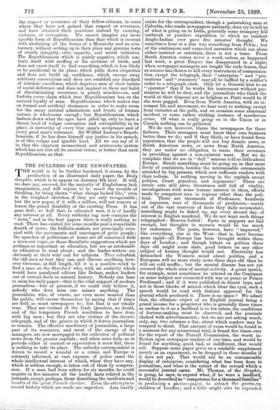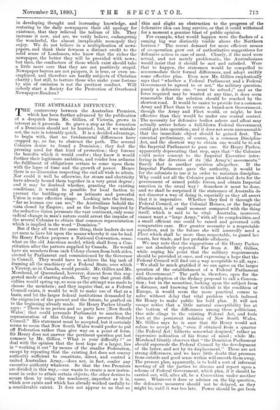THE DULLNESS OF THE NEWSPAPERS.
THE world is to be further burdened, it seems, by the production of an illustrated daily paper, the Daily Graphic, which is to appear on January 4th next. It will, -we dare say, succeed, for the majority of Englishmen lack imagination, and will rejoice to be saved the trouble of thinking, by being shown "what things looked like," even in the roughest sketches, if they are only recognisable ; but the new paper, if it sells a million, will not remove or lessen the grand disability of the existing Press. It has gone dull ; so dull that, to educated men, it is of hardly any interest at all.. Every rubbishy rag now contains the " news," and in the best papers there is really nothing to read. There has existed for some months past a remarkable dearth of news ; the bulletin-makers are principally occu- pied with the movements and marriages of great people ; the speeches of politicians at home are all concerned with a worn-out topic, or those Socialistic suggestions which are perhaps as important as education, but are as intolerable as education to read about ; and the leader-writers are obviously at their wits' end for subjects. They refurbish the old ones as best they can, and discuss anything, how- ever tiresome, at full length, till it is a positive relief to find a man on the Standard who, with an audacity which would have paralysed editors like Delane, makes leaders out of curious facts in natural history. Nobody can bear to miss his daily paper—that is the vital support of modern journalism—but at present, if we could only believe it, nobody who does miss one misses anything. The journalists, who, of course, are even more wearied than the public, will excuse themselves by saying that if times are dull, so must newspapers be ; but that is not wholly true. They are victims of the Irish Question, no doubt, and of the temporary French resolution to have done with big men ; but they are also victims of the electric telegraph, and of the groove in which it forces journalism to remain. The effective machinery of journalism, a large part of its resources, and most of the energy of its managers, are now mortgaged to the collection of political news from the greater capitals ; and when news fails, as in periods either of content or expectation it must fail, there is nothing to take its place. The unlucky correspondent is driven to record a scandal or a crime, and Europe is solemnly informed, at vast expense, of police cases the whole intellectual interest of which, when they have any, which is seldom enough, is taken out of them by compres- sion. If a man had been asleep for six months, he could acquire in five minutes all the useful facts related in the journals, except, perhaps, those describing the incidents and results of the great French electior. Even the attempts to record history which are made are imperfect. Asia hardly exists for the correspondent, though a painstaking man at Calcutta, who reads newspapers patiently, does try to tell us of what is going on in India, generally some trumpery hill outbreak or punitive expedition to which no resident Anglo-Indian ever gave five minutes' thought. We sometimes hear in a dim way something from Pekin ; but of the continuous and connected narrative which can alone either instruct or entertain, there is not a trace. From South America comes never a word, unless, as happened last week, a great Empire has disappeared in a night, when newspaper managers are taught the rude lesson, that as science has chosen to kill every instrument of communica- tion except the telegraph, their " enterprise " and "pre- cautions " and " resources " may all be baffled by a soldier's order to a telegraph clerk. Only let a General hint to an " operator" that if he works his instrument without per- mission he will be shot, and the journalists who think the world at their disposal are as helpless as Patti would be if she were gagged. Even from North America, with its in- cessant life and movement, we hear next to nothing, except local victories at the polls, and on occasion some abnormal incident or some rather striking instance of murderous crime. Of what is really going on in the Union or in Canada, nothing can be gathered.
We do not, however, blame the newspapers for these failures. Their managers must know their own business better than we do ; and if they think, or have found from experience, that the people will not buy Asiatic news, or South American news, or news from North America, they are under no obligation to waste their revenues in providing against a non-existent want. But we do complain that we are in " dull " seasons told so little about Europe. Surely something must be going on, in that most lively of continents, besides the interminable ceremonials attended by big persons, which now suffocate readers with their tedium. Is nothing moving in the capitals except politics, Court grandees, and regiments F There are surely arts still alive, literatures still full of vitality, investigations with some human interest in them, efforts made by competent men in regions other than the poli- tical. There are thousands of Professors, hundreds of inquirers, tens of thousands of producers,—surely out of the vast reservoir of facts they daily accumulate, something might be fished up, say every second day, of interest to English mankind. We do not want such things telegraphed : Heaven forbid ! Facts in snippets are bad enough, but thoughts in morsels would be too much for endurance. The posts, however, have " improved," like everything else in the West—that is, have become more rapid—all Europe has been brought within three days of London ; and though letters on politics three days old might seem stale, good letters on any other subject of human thought would not. Electricity has debauched the Western mind about politics, and a European will no more study news three days old than he will eat cold muffin ; but the mental disease has not yet covered the whole area of mental activity. A great speech, for example, must sometimes be uttered on the Continent on some subject not connected with war or peace or Prince Ferdinand ; and if it were published in decent type, and not in those blocks of minion which blear the eyes, such a speech would be read with distinct approval for the journal which produced it. There is no space ? We admit that, the ultimate object of an English journal being a grand income for a proprietor who is generally three times as useless to it as a landlord is to his estate, the conditions of fortune-making must be observed, and the journals choked with advertisements ; but we are not asking much, only, say, two columns a day, about which readers may be tempted to think. That amount of room would be found in a moment for any sensational trial, is found five times over for the report of the Parnell Commission, the worst in- fliction upon newspaper readers of our time, and would be found for anything, good, bad, or indifferent, that would sell. Suppose some paper gives us a readable supplement merely as an experiment, to be dropped in three months if it does not pay. That would not be an unreasonable display of enterprise, considering what has been done in journalism, and what is the extent of the reward which a successful journal earns. Mr. Thomas, of the Graphic, is going, he says, to expend what, if he were a landlord, would be described as " competence for a thousand families ", in producing a picture-paper, to attract the grown-up children of London ; and a little might also be expended in developing thought and increasing knowledge, and restoring to the daily newspapers their old apology for existence, that they relieved the tedium of life. They increase it now, and are, we verily believe, endangering the wonderful, the almost inexplicable monopoly they enjoy. We do not believe in a multiplication of news- papers, and think their fewness a distinct credit to the solid sense of Londoners, who know that the richer the newspaper, the better they will be provided with news ; but then, the conductors of those which exist should take a little more care that they are not positively stupid. Newspaper buyers are not paupers, it is true, or even un- employed, and therefore are hardly subjects of Christian charity ; but still, to torture those who make your fortune by sins of omission is not the prettiest conduct. Will nobody start a Society for the Protection of Overbored Newspaper-Readers ?







































 Previous page
Previous page